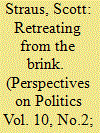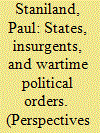|
|
|
Sort Order |
|
|
|
Items / Page
|
|
|
|
|
|
|
| Srl | Item |
| 1 |
ID:
121587


|
|
|
|
|
| Publication |
2012.
|
| Summary/Abstract |
The substantial literature on mass violence, from ethnic cleansing to civil wars, has paid surprisingly little attention to the largest instance of mass violence in human history: the Holocaust. When political scientists have approached the subject, the trend has been to treat the Holocaust as a single case, comparing it-sometimes controversially-with other instances of genocide such as Rwanda or Cambodia. But historically grounded work on the destruction of European Jewry can help illuminate the microfoundations of violent politics, unpack the relationship between a ubiquitous violence-inducing ideology (antisemitism) and highly variable murder, and recast old questions about the origins and evolution of the Holocaust itself. After reviewing new trends in history-writing, I highlight opportunities for social-scientifically oriented research centered on the interaction of state power, local communities, and violent mobilization in five areas: military occupation, repertoires of violence, alliance politics, genocidal policymaking, and resistance. My conclusion addresses thorny issues of comparison, morality, and memory.
|
|
|
|
|
|
|
|
|
|
|
|
|
|
|
|
| 2 |
ID:
121584


|
|
|
|
|
| Publication |
2012.
|
| Summary/Abstract |
How do we conceptualize the fragmentation of internally divided movements? And how does variation in fragmentation affect the probability and patterns of infighting? The internal politics of non-state groups have received increasing attention, with recent research demonstrating the importance of cohesion and fragmentation for understanding conflict dynamics. Yet there is little consensus on how to conceptualize fragmentation, the concept at the center of this agenda, with authors using different definitions and measures. In this paper we conceptualize fragmentation along three constitutive dimensions: the number of organizations in the movement; the degree of institutionalization across these organizations; and the distribution of power among them. We then show how variation across these dimensions can explain variation in important conflict processes, focusing on infighting.
|
|
|
|
|
|
|
|
|
|
|
|
|
|
|
|
| 3 |
ID:
121586


|
|
|
|
|
| Publication |
2012.
|
| Summary/Abstract |
Over the past two decades, scholars have generated a large and sophisticated literature on genocide. Nevertheless, there are still several research areas that require further work. This article outlines a research agenda that analyzes the conditions under which genocide is likely to occur, the multilevel processes of violent escalation and de-escalation, and the ways in which these processes are shaped by, connect to, reinforce, accelerate and impede one another. I argue that scholars should 1) model elite and follower radicalization processes by disaggregating genocidal "intent" over time and space, and exploring how intent emerges rather than taking it as pre-given. Doing so will permit researchers to 2) situate genocide research within a broader context of political violence in order to understand how they are related temporally and spatially, and to decenter analytical domains beyond the standard country level and single victim group in order to gain insight into the dynamics of genocide, including how perpetrator policies vary by group; 3) draw on recent advances in microanalyses of civil war to theorize about subnational patterns of violence diffusion; 4) move beyond problematic contrasts between ideology and rationality to analyze how ideologies frame the strategic choices "available" to genocidal elites.
|
|
|
|
|
|
|
|
|
|
|
|
|
|
|
|
| 4 |
ID:
121588


|
|
|
|
|
| Publication |
2012.
|
| Summary/Abstract |
The research problem driving this paper is the absence of a strong theory that accounts for variation among cases that have similar probabilities of escalating to genocide and similar forms of organized (usually state-led) mass violence against civilians. Much of the existing theory on genocide focuses on explaining under what conditions and by what processes regimes commit large-scale violence against civilians. I argue that a critical missing dimension to studies of genocide, but also more generally to the study of political violence, is a methodological recognition of negative cases and a theoretical recognition of the dynamics of restraint that helps to explain such negative cases. That is, in addition to asking what causes leaders to choose to escalate violence, I argue that scholars should emphasize conditions that prompt moderation, de-escalation, or non-escalation. I propose an alternative framework for how to conceptualize the process of political violence and review the literature to identify key restraint mechanisms at micro, meso, and macro levels of analysis. I further articulate a provisional theory of genocide using this new analytical framework. I illustrate my argument with an empirical analysis of mass violence cases in Sub-Saharan Africa since independence, and with a more in-depth analysis of comparable crises in Rwanda and Côte d'Ivoire, where the trajectories of violence differed significantly. While this paper draws on extensive empirical research, my primary purpose is not to advance a developed new theory or to test particular hypotheses, but rather to outline a research agenda that promises to draw from and contribute to recent work on the comparative politics of violence.
|
|
|
|
|
|
|
|
|
|
|
|
|
|
|
|
| 5 |
ID:
121583


|
|
|
|
|
| Publication |
2012.
|
| Summary/Abstract |
Bargains, deals, and tacit understandings between states and insurgents are common in civil wars. This fascinating mix of conflict and cooperation shapes patterns of politics, governance, and violence. Building on recent findings about state formation, I offer a conceptual typology of political orders amidst civil war. Wartime political orders vary according to the distribution of territorial control and the level of cooperation between states and insurgents. Orders range from collusion and shared sovereignty to spheres of influence and tacit coexistence to clashing monopolies and guerrilla disorder. Examples from contemporary South Asian conflicts illustrate these concepts, which are scalable and portable across contexts. Scholars need to think more creatively about the political-military arrangements that emerge and evolve during war. A key policy implication is that there are many ways of forging stability without creating a counterinsurgent Leviathan.
|
|
|
|
|
|
|
|
|
|
|
|
|
|
|
|
| 6 |
ID:
121585


|
|
|
|
|
| Publication |
2012.
|
| Summary/Abstract |
What is the relationship between civil war and terrorism? Most current research on these topics either explicitly or implicitly separates the two, in spite of compelling reasons to consider them together. In this paper, we examine the extent to which terrorism and civil war overlap and then unpack various temporal and spatial patterns. To accomplish this, we use newly geo-referenced terror event data to offer a global overview of where and when terrorist events happen and whether they occur inside or outside of civil war zones. Furthermore, we conduct an exploratory analysis of six separate cases that have elements of comparability but also occur in unique contexts, which illustrate some of the patterns in terrorism and civil war. The data show a high degree of overlap between terrorism and ongoing civil war and, further, indicate that a substantial amount of terrorism occurs prior to civil wars in Latin America, but yet follows civil war in other regions of the world. While the study of terrorism and of civil war mostly occurs in separate scholarly communities, we argue for more work that incorporates insights from each research program and we offer a possibility for future research by considering how geo-referenced terror and civil war data may be utilized together. More generally, we expect these results to apply to a wide variety of attitudes and behaviors in contentious politics.
|
|
|
|
|
|
|
|
|
|
|
|
|
|
|
|
|
|
|
|
|